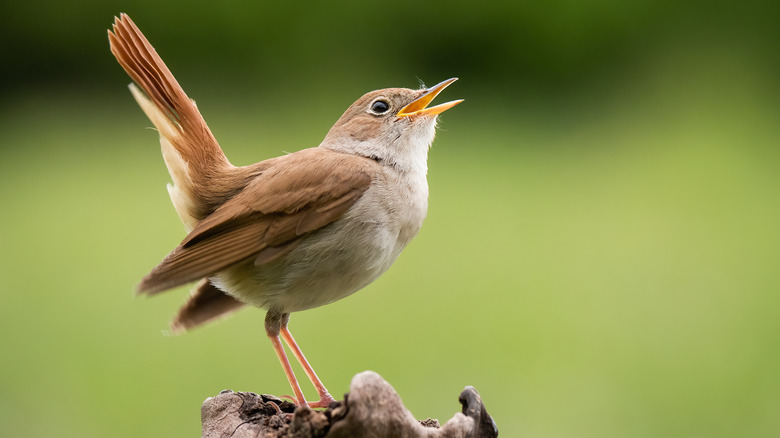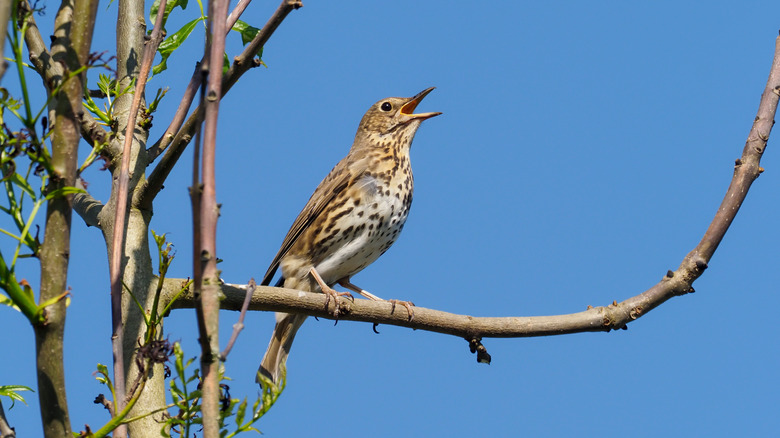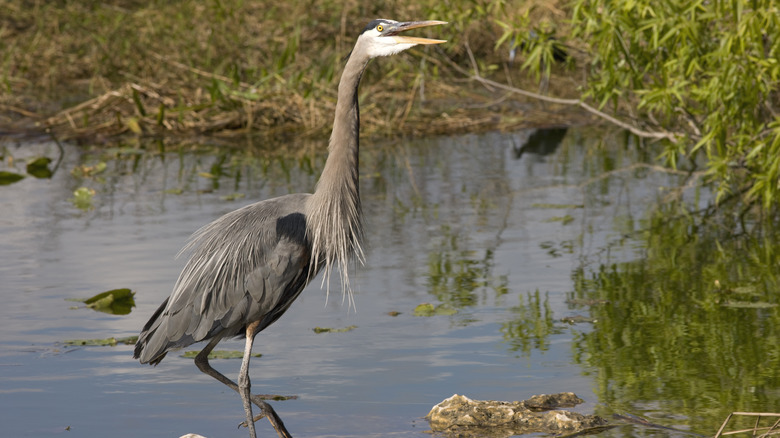The Scientific Theories Why Birds Wake Up And Chirp So Early
Some find it relaxing, others find it wildly irritating, but the truth of the matter is birds chirp — often loudly — and they do it first thing in the morning. Birds make vocalizations to communicate with each other, while male birds try to show off their musical pipes in hopes of attracting a mate (via Watching Backyard Birds).
There's a difference between songs and calls. A call is a short whistle, chirp, or similar sound, and it's the way birds typically communicate with each other about basic things and to stay in touch with their family or flock. Songs are far more complicated and are busted out for special occasions — for instance, finding mates or marking territory.
Mornings often feature a cacophony of birds blasting their songs like obnoxious neighbors, but why do they often start their chirping at such ungodly hours? It's hard to say precisely why this is, but scientists have come up with a few theories.
The Dawn Chorus
Scientists have a name for this morning chirp fest. They call it the dawn chorus, which makes it sound much more pleasant to say you were awakened by the dawn chorus, and not a bird screeching at an ungodly hour. According to Wired, the dawn chorus can start as early as 4 a.m. and can last for hours. Of course, birds will sing and make all kinds of noise during any part of the day, but the dawn chorus is distinct for the amount of lively singing and calling that happens.
"They're teeing up for the day," Greg Budney, curator for Collections Development at the Macaulay Library at the Cornell Lab of Ornithology at Cornell University, told Treehugger. "They're staking out their territory," he said. "The males are warning off rival males or even pairs of other birds." Birds will often try to find a high perch to help their songs and calls travel. "Often, it will be from high in the habitat so the birds can broadcast their song more efficiently," Budney said.
Singing early shows off fitness
According to The Spruce, getting up nice and early and belting out a few tunes as loudly as their little lungs can manage is a great way for a male bird to show how fit and full of energy they are in front of the females in his vicinity. The theory goes that this chest-puffing is intended to show that the male was strong enough to survive a night of frigid temperatures and nocturnal predators. Essentially, it's an avian victory lap. While in some species only the males will sing, others have both males and females that will sing (via The Spruce).
"But, even though it's the males you are likely hearing, it's the females who drive the system," Greg Budney told Treehugger. "They're listening and trying to figure out which male is the most fit, and therefore offers the best genes toward the survival of offspring. They'll choose a mate on how he sings."
Less ambient noise in the morning
With all that silence during the early morning hours, birds took it upon themselves to fill it with noise, but that's what makes it such a great time to start singing. According to The Spruce, during other times of day, birds have to compete with an array of other sounds — like insect noises or even traffic — for audial bandwidth. According to the National Science Foundation, noise pollution can cause a problem for birds. It has been found that birds living in quieter, forested areas have a higher sensitivity to noise.
"Although birds live in the same world we do, they experience it in a profoundly different way — they see and hear better than humans, and are more sensitive to increased light and noise," said Doug Levey, program director in the National Science Foundation's Division of Environmental Biology. Meanwhile, birds living in loud areas, but who have songs and calls that are at a lower frequency and can't cut through the other noises, tend to nest later than usual. A nice, quiet morning when most of the world is asleep can help circumvent that problem.
Sound travels better in the morning
One theory suggests that birds are like little winged barometers because they seem to understand one of the fundamentals of how sound moves through fluids. Sound moves better through air or liquids with a high density (via The Spruce). "The acoustic communication in birds is quite sophisticated, and they are very intelligent about the way they do this," Greg Budney told Treehugger.
According to Iowa State University, the speed of sound isn't constant. Sound is a vibration of kinetic energy that passes from molecule to molecule. High density means those molecules are closer together. Cool air, as is often present early in the morning, has a higher density, with molecules packed closely together. This allows the sound a bird makes to travel farther and faster. A bird who sings early in the morning can cover a wider area, which means casting a wider net for prospective mates and claiming a larger amount of territory. However, recent research has indicated that this may not be completely the case, although a bird's song is clearer and more consistent in the morning (via Wired).
Birds can't do other bird things that early in the morning
Another theory for why birds sing so early in the morning is pretty simple: What else are they going to do? Of course, it's dark early in the morning, which complicates tasks like trying to gather food or pick up some nest-building supplies. Plus, air currents aren't as useful to help any birds in the process of migrating, so there isn't much better to do aside from singing since, according to Wired, light doesn't play a role in birds' ability to communicate.
Communication is important for birds, and they can even figure out if a bird doesn't belong in their group based on how it makes calls and sounds, as birds have regional dialects just like humans. "They know who is in the family and who is not and can identify an interloper because he or she doesn't know the key to the proper 'pronunciation' of a call," Budney told Treehugger.





